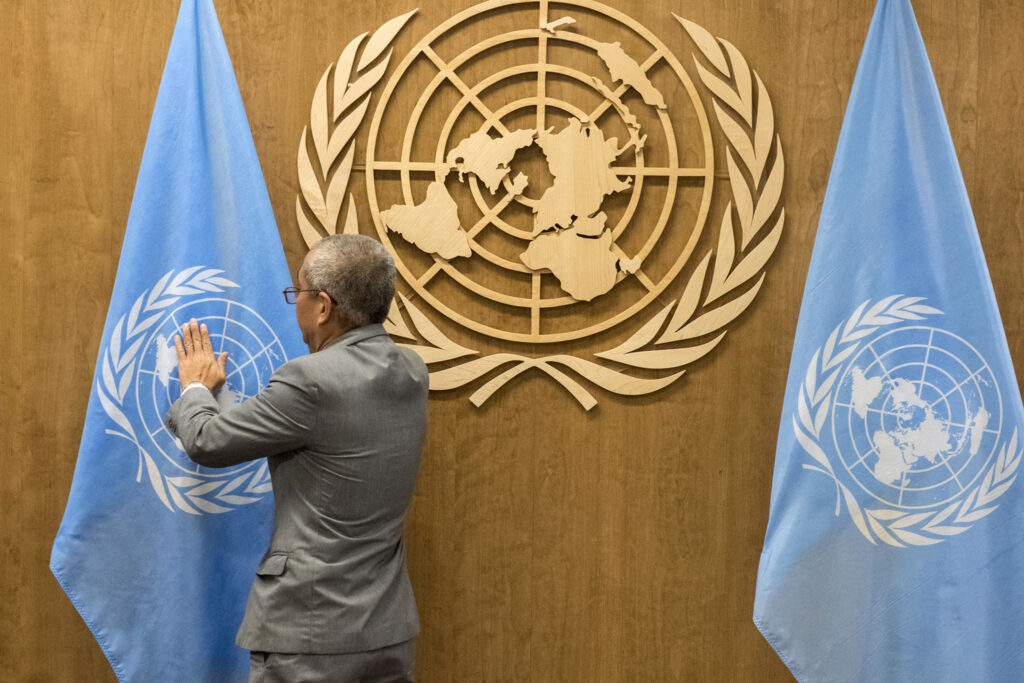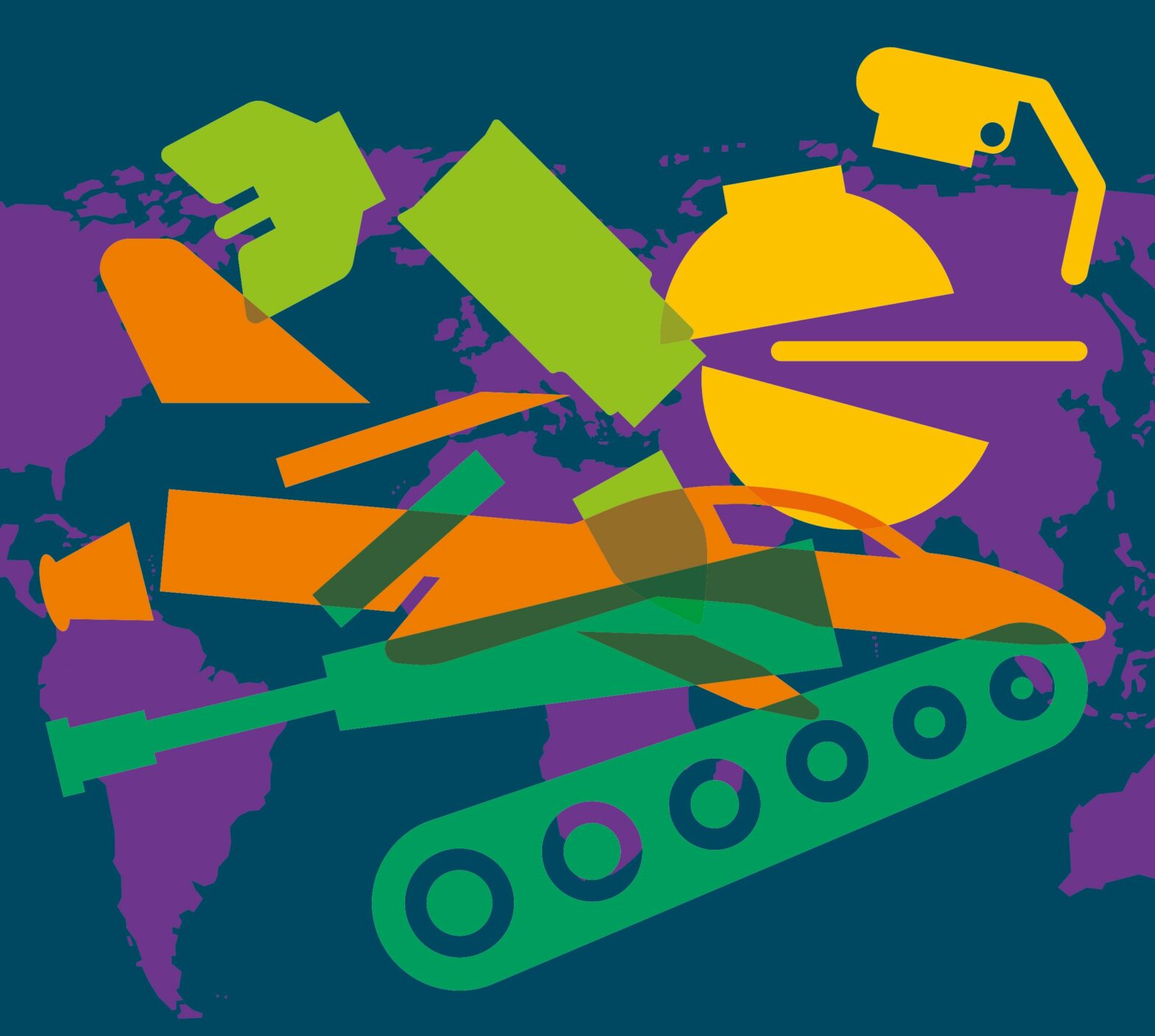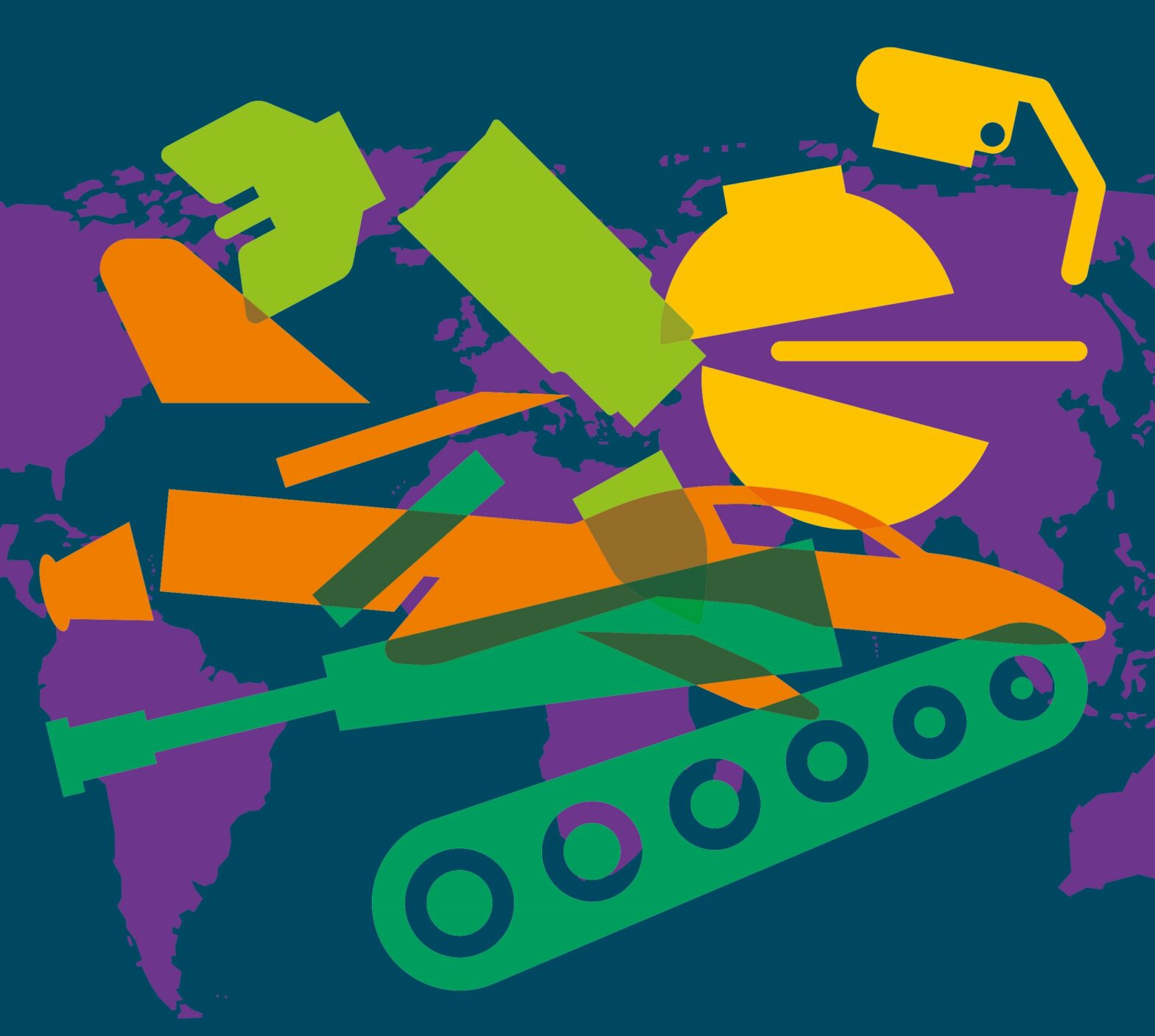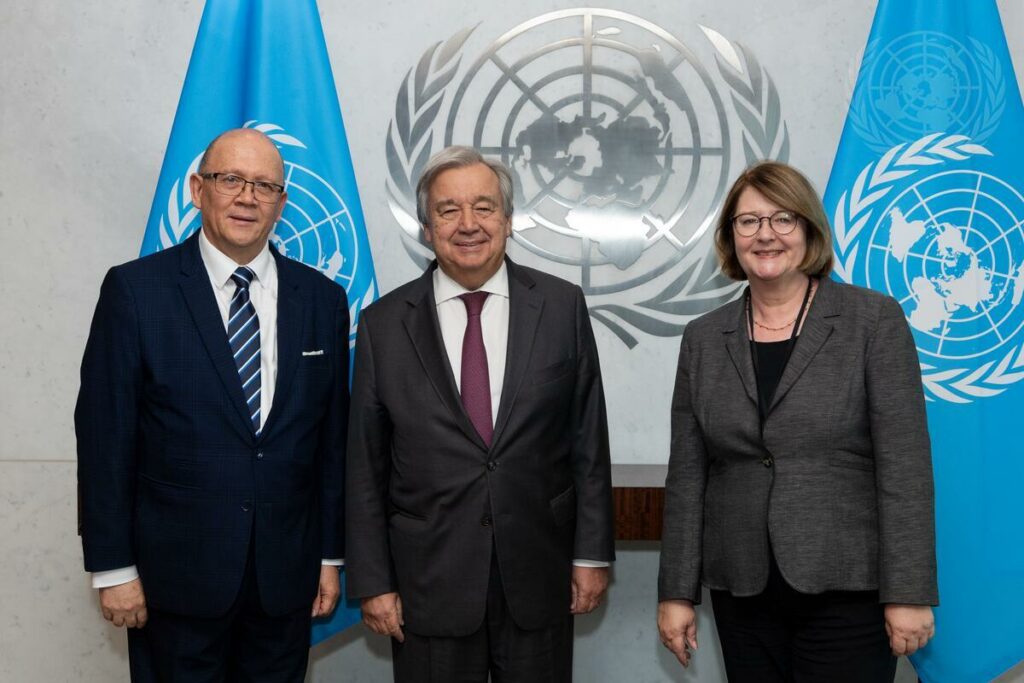Share Twitter Facebook Email Copy URL
Stefano Prato on the limits and possibilities of the United Nations at 75

Stefano Prato is Managing Director of the Society for International Development (SID), coordinator of the Civil Society Financing for Development Group, and a member of the Editing Team of the annual Spotlight Report on Sustainable Development. He currently serves as Co-Chair of the High Level Political Forum (HLPF) Major Groups and other Stakeholders Coordination Mechanism Steering Group.
Flags being prepared before a UN General Assembly General Debate in New York, September 2017. CC BY-NC-ND 2.0, UN Photo/Kim Haughton
The United Nations marks its seventy-fifth anniversary in turbulent times, with the world confronting the harsh impacts of multi-layered social, economic, political crises now exacerbated by the pandemic. Human rights, peace and security, and development are the three pillars that supposedly guide the UN and its 193 member states. At this historical turning point, where global collective action and a coordinated response are more needed than ever, criticisms and questions concerning the future of the UN linger. Does the organization have what it takes to inspire and mobilize the world to, as the slogan goes, “recover better, together?” And if it does, what changes and innovations are needed for the United Nations live up to its raison d’être?
The Rosa-Luxemburg-Stiftung’s Tetet Lauron spoke with international development expert Stefano Prato to get his opinion on the UN’s role as a forum for global justice struggles and where he sees the institution 75 years after its founding.
RLS: Stefano, are there reasons to celebrate the UN’s anniversary?
SP: The mandate and aspirations of the United Nations provide excellent reasons to celebrate, and even more so in today’s pandemic context. Some might suggest that the legitimacy of the United Nations rests on the centrality of the nation state—a highly contested space in many spheres, due not least to the extensive capture of power by elites, whether of economic, racial, or other origins. Yet one could argue that the central pillar of the United Nations is framed by the Universal Declaration of Human Rights and the way it defines the role of nation states with respect to the inalienable rights of all their citizens. Of course, we cannot turn a blind eye to the human rights violations that persist and in some cases have even increased. But the very existence of a supranational space where these abuses can be exposed, reported, and condemned remains an achievement to be celebrated.
This is the conundrum of the state: while it is deeply complicit in the current dysfunctional realities—whether inaction, direct abuse, or elite capture—it will continue to be the centre of many transformational aspirations. And a supranational space that—even if at times only nominally—remains centred on the rights and egalitarian aspirations of every person irrespective of gender, age, race, and abilities will always provide the opportunity to crack hegemonies and, paraphrasing Leonard Cohen, allow rays of light into the room.
The harsh reality of a significantly unfinished agenda should therefore lead us to celebrate and renew our aspirations, reconfirming the necessity of a universal, inclusive, and democratic space that can advance our common pathway towards the full realization of human rights and sustainable development. While the seventy-fifth anniversary should certainly be an occasion to look back and reflect on what has not worked, it might be more important to look ahead and renew our quest to democratize multilateral governance in order to ensure people-centred responses to our common challenges on this small planet.
During the commemorative activities at the UN General Assembly, many member states lauded the UN’s “achievements”, including preventing open shooting wars between countries. How would you characterize the UN’s achievements as the penultimate platform for international cooperation?
There is no doubt that the United Nations has been and continues to be the critical space where the intergovernmental development agenda is shaped and shared. The level of progressiveness is obviously the result of the political interactions between member states, and the last few years have witnessed significant retrogression in several areas under pressure from developed countries and their conservative economic elites.
However, despite its limited emphasis on systemic reforms and concerning levels of corporate capture, the 2030 Agenda for Sustainable Development remains a remarkable achievement in global agenda setting. It provides a comprehensive and universal framework that connects and integrates elements of the agenda which were previously disconnected.
Some civil society organizations and social movements are obviously deeply troubled by the growth paradigm embodied in the 2030 Agenda and its limited emphasis on the need to end the ongoing extraction of resources and wealth from the Global South. But we have to recognize that the United Nations offers a mainstream comprise among nations, and we cannot expect it to be radical terrain.
The UN provides a clear point of reference for civil society to engage, criticize, and even discredit the current paradigms, therefore offering a legitimate intergovernmental agora in which to share, support, or contest development norms, policies, and programmes. The UN process remains the only institutional space where the creative tension between radical transformational agendas and their mainstream incarnations can be exposed, no matter how much democratic space may have shrunk in recent years. This is an achievement to celebrate, protect, and enhance.
Some observers argue that the UN has declined in relevance in recent years. What is your view on this? Why do you think the idea that the UN is facing twin crises of legitimacy and relevance has gained more traction?
Over the past two decades, we saw the emergence of a hegemonic and homogenizing form of hyper-globalization driven by global finance and technology, which further consolidated the global post-colonial division of labour and increased the concentration of income and wealth in fewer hands. This was facilitated and supported by many global economic governance institutions, captured by the vested interests of their primary shareholders and the political and economic elites benefiting from this economic order.
While not immune to these power asymmetries and developed countries’ push for the model of globalization that benefits them, the UN remained anchored—albeit under more challenging circumstances and with reduced energy—to critical notions of de-colonialization, democratic governance of global affairs, and international cooperation towards more equitable sustainable development. Often in opposition to international financial institutions and the World Trade Organization, the UN remained the critical locus of resistance and reconstruction for a development agenda more consistent with developing countries’ needs and aspirations.
This is not meant to oversimplify global governance and assume the United Nations to be free from the same political economies of other institutions, but rather to recognize that its universal and democratic character, its anchoring in the normative framework of human rights, its sustainable development aspirations, and its open modalities to civil society and societal constituencies provide a theoretical legitimacy that no other space enjoys.
We’ve heard a lot of calls for “stronger multilateralism” these days. What does that mean? How does it look? How can it be achieved?
Multilateralism between nearly 200 countries with significantly different capacities and marked power asymmetries is a wild beast, particularly under the strenuous attacks of corporate capture and forum shifting. There is no easy recipe for reform, particularly when powerful players do all they can to undermine it—fostering financial uncertainty and donor dependence, promoting the emergence of parallel fora that overshadow UN mandates, and by strengthening institutions with partial rather universal membership that encroach and undertake key UN functions.
This does not mean that the United Nations should not be changed. Indeed, it is difficult to make the case for the current UN development system in the absence of significant reforms and even scaling down some of its elements. At the same time, new UN-centred economic governance institutions are urgently required, such as an intergovernmental tax body to negotiate and implement new tax regimes to tackle illicit financial flows, a sovereign debt restructuring mechanism to comprehensively and systemically deal with sovereign debt crises and debt sustainability challenges, or a technology governance mechanism to promote technology justice and govern rampant digitalization.
This would shift multilateralism towards the normative space rather than the operational and monitoring realm. But overall, the obstacles to a stronger multilateral system are posted by those countries with more to lose in a more democratic global order, namely the current winners of the global division of labour who have reframed the aspirations of the post-colonial order into the neo-colonial character of economic hyper-globalization.
It is difficult to change multilateralism exclusively from within the intergovernmental system: the democratization of global economic governance also requires a closer bridging of the democratic and bureaucratic deficits exposed by governmental representation by providing active and substantive civil society engagement at all levels. In this context, large segments of civil society, catalysed by the Civil Society Financing for Development (FfD) Group (the inclusive mechanism that engages civil society constituencies and social groups in the FfD process), have been calling for an Economic Reconstruction and Systemic Reforms Summit under the aegis of the United Nations, to discuss and negotiate a new global economic consensus that could alter the trajectory of the current extractive and destructive pattern of globalization and re-centre human rights, social and gender justice, and ecological sustainability.
While some might smile, regarding it as a naïve proposition, the idea is gaining more traction, particularly given the systemic failures and structural inequalities exposed and magnified by the pandemic and the multiple crises it has ignited. The power of the United Nations rests in the fact that such a summit, with all the normative decisions and institutional re-designs it could achieve, is possible at any time. It is only one decision away.
Of course, institutions captured by political economies tend to protect the status quo and would not want to alter the asymmetries of power, as these dominate the institutions themselves. These institutions need to be pressured from outside, which is one among many key roles played by organized civil society and social movements. Multilateralism will hardly change without it.
You once said that civil society “should stop chasing after international meetings”. Can you elaborate on this? How can civil society set an alternative development agenda, and what would it look like?
Civil society has made enormous progress in working collectively and speaking with one voice in many multilateral processes. But it remains deeply fragmented and still struggles to connect the dots and step up to the big systemic reform game. Unhealthy dynamics of donor influence, short-term orientation, logo obsession, technocratic versus political focus, as well as an NGO-centrism that tends to correspond to Eurocentrism continue to complicate matters and promote the “launching-our-new-report-at-the-next-UN-meeting” logic. This tends to generate excessive attention on chasing international meetings and their “tinkering with the margins” agendas, rather than constructing a collective agenda and strategy for systemic change.
While many civil society proposals offer powerful pathways for change, they require much broader and stronger social foundations to be able to shake the deeply rooted political economies that protect the status quo. At the same time, large social movements will not mobilize on sectoral and/or specific reforms unless they are part of a wider narrative and political movement for structural change. Constructing such a narrative at the intersection between the domains of social, gender, climate, food, and economic justice should become the crucial focus of collective civil society movements.
Cross-sectoral campaigning for new social and ecological foundations for global economic frameworks and institutions in the context of an Economic Reconstruction and Systemic Reforms Summit could offer many opportunities to go beyond limited reformist agendas for a broader social movement for real change. However, this is only one of many occasions ahead of us, and the convergence of agendas into a wider social mobilization needs to occur independently of the scheduling of UN meetings.
While the United Nations may offer the best terrain for advancing struggles at the global level, these need to emerge from a confluence of many rivers of change that spring from people, communities, and collective networks. The active search for this confluence to mobilize and demand systemic change should become the guiding star of all civil society movements.
In the words of Frederick Douglass, “Power concedes nothing without a demand. It never did and it never will. Find out just what any people will quietly submit to and you have found out the exact measure of injustice and wrong which will be imposed upon them, and these will continue till they are resisted with either words or blows, or with both. The limits of tyrants are prescribed by the endurance of those whom they oppress.”



